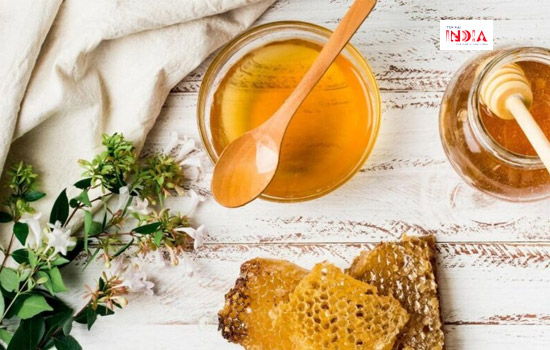Read here to know more about the health benefits of this elixir and ways to include it in your daily diet.
Honey, as per Ayurveda, is considered one of the five elixirs or Panchamrita. It is an important medicine that is not a plant but a by-product.
Honey initially starts as nectar present in flowers. These nectars are collected by honey bees– nature’s pollinators– and stored in the hive where it breaks down to eventually form the golden-colored liquid.
Since ancient times, honey has been a very important medicine in other cultures such as Greek, Roman, Egyptian, and Chinese. In Ayurveda, it’s used for both internal and external applications. It is used as a treatment for skin burns, rashes, hiccups, indigestion, weight loss, and worm infestation.
Fresh honey increases body mass whereas old honey decreases body mass but results in constipation. Honey should never be heated because it turns toxic.
Recommended Story – Health Benefits of Ayurvedic Superfoods: Tulsi
According to Ayurveda’s medicine scripture Sushruta Samhita, these are the eight different types of honey
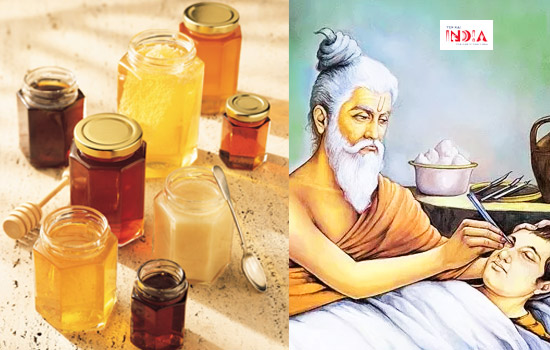
Pauttika: This honey is obtained from poisonous flowers. It is slightly yellowish and has dry and hot properties. It doesn’t have therapeutic effects as it disrupts the balance of the three doshas– Vata, Pitta, and Kapha
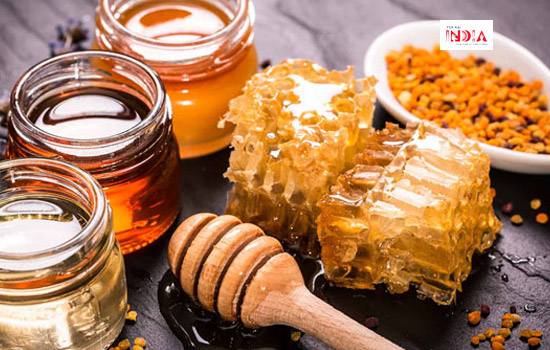
Bhramara: This type of honey is heavy, white, and not easily digestible. It is slimy and excessively sweet to taste.
Kshaudra: This type of honey is light brown, easily digestible. It can be used by people with diabetes.
Makshika: It is the best type of honey. It is golden brown, lighter than Kshaudra, and especially used for cough, asthma, jaundice, and piles.
Chatra: It is dark brown and has a sweet taste. This honey is heavy and not easily digestible. It has cold and slimy properties. It is given as a remedy for bleeding disorders, skin pigmentation, and worm infestations.
Arghya: It is white and has a pungent taste. Arghya honey is beneficial for the eyes, and it balances Kapha and Pitta Dosha
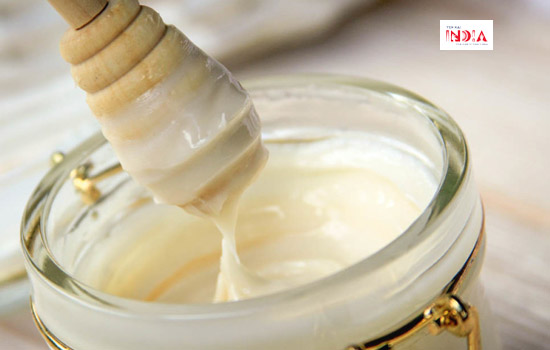
Auddalaka: It is yellowish-brown and improves vocal cords. It is also used as a remedy for skin diseases. It has a pungent taste after digestion.
Dala: This honey is pink in color, dry, and sour-sweet to taste. It is prescribed for vomiting and diabetes.
Recommended Story – Health Benefits of Ayurvedic Natural Foods: Ginger
Benefits of Honey
1.Wound Healing
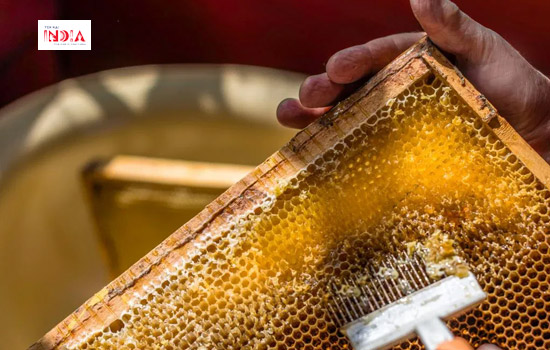
Honey was first and foremost used for wound healing during the old days, and this property has been extensively studied. Honey heals nearly all types of wounds—cuts, sores, ulcers, amputations, surgical wounds. Scientists are not able to pinpoint a specific compound in honey that helps heal wounds.
2. For sore throat, cough, and cold
Honey is another natural remedy for treating cough, cold, and sore throat. Ayurvedic texts emphasize the beneficial nature of honey in treating stubborn coughs. Honey has been reported to have antimicrobial and antiviral properties.
Taking a tablespoon of honey with a 1/4th teaspoon of cinnamon for 3 days cures most coughs and clears the sinuses.
3. To fight acne
Because of its wound healing and antimicrobial properties, honey can also be used to fight stubborn acne. Though there is no clear evidence that honey stops more acne from popping up, it does help with redness and swelling.
Mix a tablespoon of honey with a teaspoon of cinnamon powder and apply this paste where you have acne, for two weeks to see results. It is always good to do a patch test (apply the paste to a small portion of your skin) to see if it works, as everyone’s skin is different.
4. For oral health
Many studies have concluded that honey is helpful for oral hygiene. It prevents gingivitis or gum inflammation and the formation of dental plaques that lead to tooth decay. Regular, but small quantities of eating honey can improve mouth odor. Several reviews suggest that honey also helps prevent oral cancer.
5. Strengthens immunity
Honey prevents the growth of around 60 species of bacteria, making it a great medicine to strengthen the body’s immunity. Having honey as part of your diet helps your white blood cells defend against viruses and bacteria.
6. For eye ailments
One of the most prominent uses of honey in Ayurveda is for eye ailments. Applying honey drops daily to the eyes improves eyesight. Regular use of honey also helps prevent eye cataracts.
(Please consult an Ayurvedic physician for the right type of eye drops containing honey. Do not put the honey available in your kitchen into your eyes.)
7. For stomach ulcers
Another great use of honey is that it helps treat ulcers. These sores are similar to external rashes but they appear on the linings of the digestive tract. Because of honey’s antioxidant property, it efficiently protects the inner lining. It is also useful for other diseases that occur due to increased acidity.
Moreover, the sweetness of honey makes it a great aid for ulcers but it should not be taken in excess, as honey itself is Pitta or heating. People who have Pitta imbalance–they are the ones who suffer from hyperacidity, eczema, psoriasis–should not use honey in large quantities.
8. To fight cancer
Along with oral cancer, honey also helps fight against other cancers like gastrointestinal and bone cancer because of its antioxidant property. It can also be used topically after the radiation therapy to help decrease inflammation.
Ways to include honey in your daily diet

There are multiple ways to include honey in your daily diet–
- Drink one tablespoon of honey with warm milk before going to bed. It acts as a sedative.
- Honey mixed with lemon and radish juice is a great remedy for the cold.
- For gingivitis, gargle honey with warm water.
- Including one tablespoon of honey along with your food stimulates digestion and is effective against constipation, acidity, and obesity.
- Giving a teaspoon of honey to young children strengthens their immune system helping them build disease resistance.
- Honey can also be used as a quick source of energy after a workout.
- Having a tablespoon of honey with a small amount of cinnamon powder helps arthritis, bladder infections, and indigestion.
The ancient Vedic civilization considered honey as one of nature’s most remarkable gifts to man. According to Ayurveda, honey is a boon to those who have weak digestion. It has varied uses and is a staple ingredient in the kitchen. It can easily be substituted with sugar to draw its benefits, but in order to be effective, honey should be taken in small doses (half to one tablespoon)
Also Read – Health Benefits of Amla (Indian Gooseberry)


